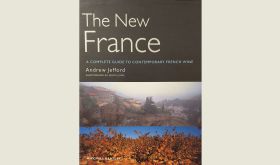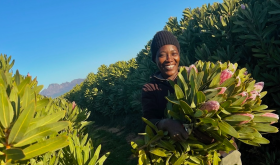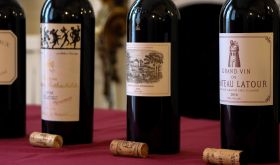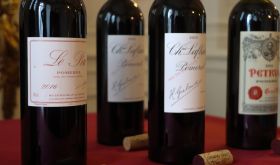We're publishing just one of the two articles submitted by candidate number 16 in our wine writing competition as we think it's particularly eye-opening. Charlie Hodd, whose photograph is of a particularly venerable cellar in Reims, writes about himself:
I'm male, 27 years old, and live and work in central London for a well-known Champagne house.
Previously I worked for nearly three years at a fine-wine merchant. I'm particularly interested in the way restaurants and bars are shaping and influencing how, why and what we now drink in the UK. It goes without saying that wine is a hugely important part of my life.
Big brands, money and your wine list
For many people their first taste of a complex, interesting, sit-up-and-take notice wine occurs in a restaurant. One of the great enduring things about wine lists is that even to the most experienced and adventurous among us, there is almost always something of the unknown lurking within its pages. Obscure grapes, producers, regions and vineyards still make their first presence felt to future devotees in this way. In modern restaurants, bars and hotels (known as the on-trade), it’s not just the Instagram-ready dishes and social media hype that are prerequisites to queues and acclaim. Wine has now been elevated to an almost equal standing and in some cases the main event. New trends have emerged and many of us are extolling the virtues of grower champagnes, orange wines, obscure Italian DOCs and Coravin. The wine list is more important and exciting than ever.
But while there are mavericks and trailblazers willing to take the risk on original and exciting offerings (a great reflection on an increasingly passionate, interested and clued-up public), powerful forces are doing all they can to suppress these vinous non-conformists and streamline our choice. It’s fair to say head chefs still have the final word on the style, presentation and quality of the food they prepare and plate in their kitchens. When it comes to the wine and drinks on offer, however, it becomes a little less black and white.
A quick glance across the wine lists of some of the great and the good of the restaurant and hotel world will show you that originality, passion and excitement are rarely the priority. Has your Marlborough Sauvignon Blanc been chosen solely for its stand-out quality and typicity? Is your flashy Chilean Cab there by virtue and value for money? Do we really know who and what is calling the shots? Increasingly prevalent practices within the UK on-trade suggest that it is simply naive to believe that restaurateurs, buyers and sommeliers choose only the best and most relevant for their customers. London in particular has become a war zone for big brands, suppliers, merchants and brokers offering the biggest and the best in backhanded incentives, free stock, VIP travel, corporate hospitality and – most of all – cold, hard cash.
Huge contracts packed with the wide, all-bases-covered portfolios of giant drinks companies are threatening to homogenise wine lists and stifle any advances individuals are trying to make on the wine we consume. Even a small amount of research will reveal the same labels and producers cropping up over and over. It should come as no surprise that in general they belong to just a handful of these heavyweight suppliers and companies whose sole aim is to monopolise all before them. Those who follow on-trade business developments closely will have observed a number of key mergers and takeovers among large UK suppliers in the past year or so, suggesting that this issue is only going to get worse.
Behind almost every listing of grande marque champagne in large West End brasseries and hotels will be (at a minimum) dubious lump sum ‘marketing’ fees, cash retro kickbacks on every bottle, glamorous staff incentives, boozy all-expenses-paid trips to winemaking regions, and hundreds of units of stock free of charge. If you can’t offer this, you’re simply not in the game. For the decision-makers it’s open season and prime seats on key wine lists go to the highest bidder, guaranteeing high sales volume, brand recognition and prestige. While this is most acutely felt in the capital, it isn’t a problem confined to the interior of the M25. From Plymouth to Perth you’ll find the same wines on the same lists in the same hotel chains and restaurant groups. Suddenly the on-trade’s ability to truly influence the wine we consume looks to be under threat in favour of the mostly bland standardisation favoured by the supermarkets.
For wine newcomers and long-term lovers alike this is a troubling development. At a time when wine finally seems to be gaining the kind of upward mobility and accessibility that food has had in recent years, rampant commercialism looks set to intervene. The latest advances in originality, variety and personality in wine lists are at great risk of being suppressed by insipid, big-volume brands and suppliers looking to seal the deal at any cost. Just as high-street chains bulldoze family-run businesses into oblivion across the nation, independents are fighting to be heard. Small winemakers and producers who strive for quality and integrity are struggling to gain any kind of foothold in essential foreign markets. Bad harvests, currency fluctuation and heavy taxation combine to add to their woe. Passionate niche suppliers are struggling to find an in-road to a key on-trade sector dictated and enslaved by money. This cash-strapped post-Brexit world of uncertainty looks set to put pressure on the trade as never before, coupled with soaring rents and rates decisions won’t be made quite so easily. Suddenly that contract begins to look an increasingly attractive option regardless of how much integrity is involved. Compromising the wine list is an all-too-easy option.
Consumers must be made aware of what is happening, how it is happening and the need to act. The obscene mark-ups on wine that we silently swallow are already an inconvenient truth of the restaurant world. We should be careful not to sleepwalk into another situation where wine choice becomes controlled in such a way. Out of principle we need to reject this wherever possible and support those who fight against it whenever possible. Passionate individuals need our support more than ever. Strive to remain open-minded at all times and take the path less trodden.
The on-trade finds itself at a crossroads – reject the big brand juggernaut and try to truly offer something fantastic and diverse, or sell out to the man and watch singularity be consumed by uniformity and capitalism. The experience and needs of the customer must be the priority. It is now or never time for the wine-list revolution. We need to stop big business monopolising another aspect of society, however small, and dictating choice. It’s still an exciting time for wine in the UK; let’s not close our borders.














